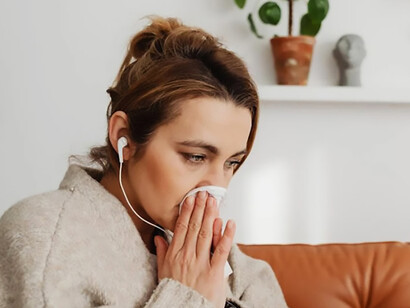Whether you’re a professional opera singer, a member of your local community choir, or love karaoke, you’ve probably experienced the simultaneous euphoria and dread that accompanies spring. Here in Northern Europe, spring means the tentative return of the sun after months of dark grey skies—but it also means an explosion of flowers, grasses, and trees. Although a field of cheerful flowers is a lovely sight, it also signals a challenging time for singers: allergy season. Singing with allergies can range from challenging to nearly impossible, but there are some techniques to help keep your voice healthy despite nature.
Allergies 101
Although there are many allergens, some of which (like dust and mold) are not restricted to a specific season, many people suffer from seasonal allergies. The top culprits in the USA1 are ragweed, tree and grass pollen, and mold. Although these tend to flare up during specific months, the seasons are not fixed and can vary from year to year.
When there’s an important concert or life-changing audition on the horizon, a singer’s biggest fear is becoming sick. During allergy season, it can be tricky to tell the difference between allergies, a cold, the flu, or COVID. Although the symptoms can be similar, including sneezing, congestion, coughing, a constantly runny nose, and post-nasal drip, the one symptom that always stands out for me is itchy ears and an itchy soft palate.
If you notice that there are a few months every year when your soft palate and ears start itching, that’s probably a sign that you’re allergic to a specific pollen or grass that blossoms around that time. Professional singers might want to schedule an appointment with an allergist to determine the exact cause of their allergies so they can plan their performing schedules, or at least know to take precautions before the symptoms get too bad.
How to sing with allergies
Once you’ve identified your allergen, you need to figure out how your body reacts. Do you lose your voice because of an unending post-nasal drip? Does the constant coughing give you a raspy sound and thicken your cords? Or is your nose so congested that you find it hard to get in a solid, supportive breath? Try out some of the tips and see what works for you. Every voice and body is different, so what one singer swears by might make everything worse for you. Just don’t try these out on the day of a performance or audition—you want to see how your voice responds first.
Steam
Regardless of your symptoms, a nice long steam will probably help. Boil some water and grab a medium-sized bowl and a towel. Once the water is boiled, pour it into the bowl, add some essential oils if you want (I love eucalyptus), and cover your head as you lean over the bowl. For about 15 minutes, slowly breathe in and out, letting the steam loosen any congestion and get everything moving. If you find it too hot, just let the water cool a bit before going back in for more.
Many singers are constantly on the go, especially during audition season. There are travel steamers, some of which are electric or even use batteries. The only downside to steaming is that it can cause your vocal folds to relax too much, so you’ll want to wait at least a few hours before singing or talking too much.
In addition to steaming, you can try using a Neti Pot2 to clear out your nasal cavity. Fill a Neti Pot with distilled water (don’t use tap water) and saline solution, and tilt your head to the side. Pour the liquid into one nostril and move your head gently until it starts flowing out the other nostril. Repeat the entire process with the other side. Neti pots can help clear out congestion and give you a break from post-nasal drip.
Take allergy medicine
This one might seem obvious, but many singers are cautious about taking medicine—for good reason. The vocal folds are tiny, delicate, and fickle muscles that can react to many things, ranging from ibuprofen to chocolate. If you know when your allergies tend to be the worst, start taking the medicine a week or two before to build up your tolerance. Most doctors recommend taking the pills at night since they can sometimes cause sleepiness.
Keep an eye on your symptoms. If they seem to be getting better, but your voice feels crunchy or dry, try another type. Always consult with your doctor if you need to take the medicine long-term. Some allergy medications can cause problems when you stop taking them or could interact with any other medications you take.
You may also want to consider nasal sprays. Personally, my voice doesn’t like them since they tend to irritate my vocal folds more than they clear my sinuses. That being said, I have many friends who swear by them. You can find a range of sprays available, from over-the-counter saltwater sprays to prescription cortisone sprays. If your primary symptom is congestion, nasal sprays can quickly provide relief. Make sure to read the warnings, since most sprays are only ok for short-term use.
Hydrate, hydrate and hydrate
Singers are known for their scarves, ever-expanding collections of herbal teas, and giant water bottles. You’re probably already drinking a lot of water, especially if you’re in day-long rehearsals. Unfortunately, one of the downsides of allergy medication is dehydration, so try to up your liquid intake. Add a daily isotonic drink, take your vitamins in liquid form, and keep your water bottle full at all times.
Double down on the stereotype and drink as much tea as you can handle. While caffeinated drinks like coffee and matcha will dry you out even more, herbal teas can help rehydrate and also coat the cords (especially if you add a squeeze of honey). Although it’s best to drink the tea while hot, since it can double as a mini-steam moment, iced herbal tea is also a great way to stay hydrated in the heat of summer.
Wear a mask and invest in air filters
The pandemic may be over, but masks can still be an essential part of a singer’s packing list. They’re great for staying healthy during a long flight or train ride to your next performance and even better at protecting your voice from allergens. If you notice allergy symptoms appearing every time you step outside, try wearing a mask. You might get some strange looks, but it’ll help, especially if you’re en route to a rehearsal or audition.
Masks are also useful if you have a dust allergy. Next time you dust, vacuum, or change the sheets, try wearing a mask and see if it helps reduce your symptoms.
Depending on your location, you might have the windows open all summer, especially if you don’t have air conditioning. Consider investing in a HEPA air filter to help reduce the number of allergens in your home. If you have pets, an air filter is essential since Fido will definitely track in pollen, grass, dust, and dirt and immediately shake it off as close to you as possible.
Take plenty of time to warm up
When you finally carve out time to practice, it can be tempting to jump right into the music. Although warming up should always be your first step, during allergy season, it is non-negotiable. Besides the effects of the allergen itself (swollen chords, congestion, forward placement from coughing), you may also have to deal with some side effects from your treatments.
Even if your choir director does a group warm-up, make sure to do these warm-ups at home or even in the bathroom before rehearsal starts.
First, begin with a gentle, low hum. Start low in your register and very quietly descend by half steps. When you reach the absolute end of your voice, make your way back up to the starting pitch.
As you hum, pay attention to your chords. Does it feel thick or dry? Are you struggling to close them? Does it hurt to phonate? If it feels dry, take a break to hydrate more with an isotonic drink or some tea and come back in a bit. If it feels thick or won’t close, continue the humming, beginning each passage a half step higher. If it hurts, stop and try to see an ENT and your voice teacher.
When you reach your passagio, it might start to feel a bit tighter. Pay attention to your break and check to see if there are any specific areas where it feels thicker or becomes much harder to phonate. If you’re feeling okay, you can move to a gentle oo and let your voice slide up and down.
Once you’ve done these, you should be able to identify any area-specific problems and can target them in the rest of your warm-ups.
Know when to stop
The hardest part about being a singer is that our instruments are inside of us, which means sometimes they don’t work the way we want them to. If it hurts to talk, you can’t phonate in certain parts of your voice without pushing, or you can’t hum at all, don’t try to sing. Schedule an appointment with an ENT who has experience with singers and rest. Sometimes, the best trick is to simply be quiet for several days. Try to avoid talking, but if you must, talk at a normal, easy volume. Whispering will cause even more strain on your voice.
If you find yourself regularly having to cancel performances, call out of rehearsals, or back out of auditions because of allergies, you might want to consider desensitization therapy. It’s an intensive process that takes about 3 years. While it doesn’t completely remove your allergy, it will bring it down to a manageable level.
Allergies can be incredibly frustrating to deal with, especially since many are unavoidable. Through trial and error, I’ve discovered which tricks help and which ones hurt. Try out as many tricks as you can and see what keeps your voice happy during allergy season.
References
1 Yale Medicine. (2025). Seasonal allergies (allergic rhinitis).
2 Healthline. (n.d.). How to use a Neti Pot.















